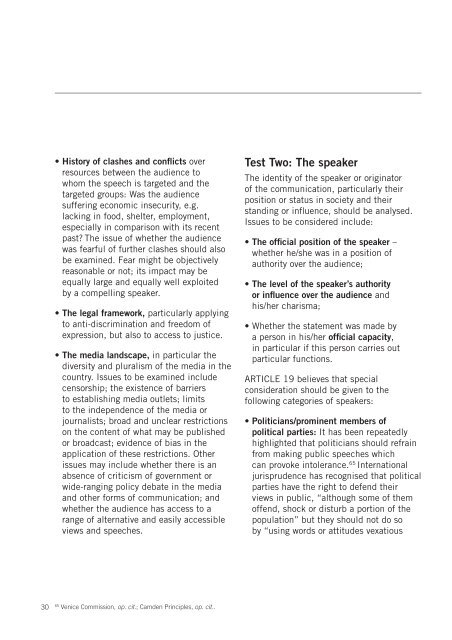ARTICLE-19-policy-on-prohibition-to-incitement
ARTICLE-19-policy-on-prohibition-to-incitement
ARTICLE-19-policy-on-prohibition-to-incitement
You also want an ePaper? Increase the reach of your titles
YUMPU automatically turns print PDFs into web optimized ePapers that Google loves.
• His<strong>to</strong>ry of clashes and c<strong>on</strong>flicts over<br />
resources between the audience <strong>to</strong><br />
whom the speech is targeted and the<br />
targeted groups: Was the audience<br />
suffering ec<strong>on</strong>omic insecurity, e.g.<br />
lacking in food, shelter, employment,<br />
especially in comparis<strong>on</strong> with its recent<br />
past The issue of whether the audience<br />
was fearful of further clashes should also<br />
be examined. Fear might be objectively<br />
reas<strong>on</strong>able or not; its impact may be<br />
equally large and equally well exploited<br />
by a compelling speaker.<br />
• The legal framework, particularly applying<br />
<strong>to</strong> anti-discriminati<strong>on</strong> and freedom of<br />
expressi<strong>on</strong>, but also <strong>to</strong> access <strong>to</strong> justice.<br />
• The media landscape, in particular the<br />
diversity and pluralism of the media in the<br />
country. Issues <strong>to</strong> be examined include<br />
censorship; the existence of barriers<br />
<strong>to</strong> establishing media outlets; limits<br />
<strong>to</strong> the independence of the media or<br />
journalists; broad and unclear restricti<strong>on</strong>s<br />
<strong>on</strong> the c<strong>on</strong>tent of what may be published<br />
or broadcast; evidence of bias in the<br />
applicati<strong>on</strong> of these restricti<strong>on</strong>s. Other<br />
issues may include whether there is an<br />
absence of criticism of government or<br />
wide-ranging <str<strong>on</strong>g>policy</str<strong>on</strong>g> debate in the media<br />
and other forms of communicati<strong>on</strong>; and<br />
whether the audience has access <strong>to</strong> a<br />
range of alternative and easily accessible<br />
views and speeches.<br />
Test Two: The speaker<br />
The identity of the speaker or origina<strong>to</strong>r<br />
of the communicati<strong>on</strong>, particularly their<br />
positi<strong>on</strong> or status in society and their<br />
standing or influence, should be analysed.<br />
Issues <strong>to</strong> be c<strong>on</strong>sidered include:<br />
• The official positi<strong>on</strong> of the speaker –<br />
whether he/she was in a positi<strong>on</strong> of<br />
authority over the audience;<br />
• The level of the speaker’s authority<br />
or influence over the audience and<br />
his/her charisma;<br />
• Whether the statement was made by<br />
a pers<strong>on</strong> in his/her official capacity,<br />
in particular if this pers<strong>on</strong> carries out<br />
particular functi<strong>on</strong>s.<br />
<str<strong>on</strong>g>ARTICLE</str<strong>on</strong>g> <str<strong>on</strong>g>19</str<strong>on</strong>g> believes that special<br />
c<strong>on</strong>siderati<strong>on</strong> should be given <strong>to</strong> the<br />
following categories of speakers:<br />
• Politicians/prominent members of<br />
political parties: It has been repeatedly<br />
highlighted that politicians should refrain<br />
from making public speeches which<br />
can provoke in<strong>to</strong>lerance. 65 Internati<strong>on</strong>al<br />
jurisprudence has recognised that political<br />
parties have the right <strong>to</strong> defend their<br />
views in public, “although some of them<br />
offend, shock or disturb a porti<strong>on</strong> of the<br />
populati<strong>on</strong>” but they should not do so<br />
by “using words or attitudes vexatious<br />
65<br />
30 Venice Commissi<strong>on</strong>, op. cit.; Camden Principles, op. cit..


